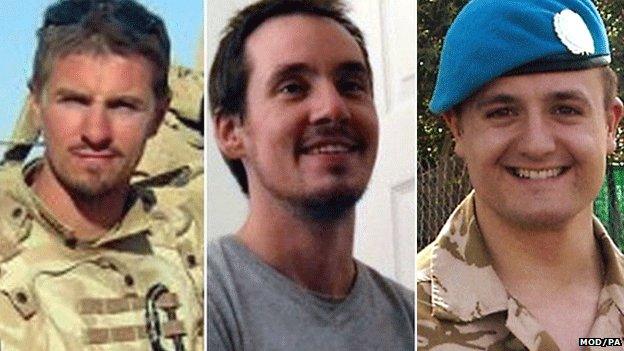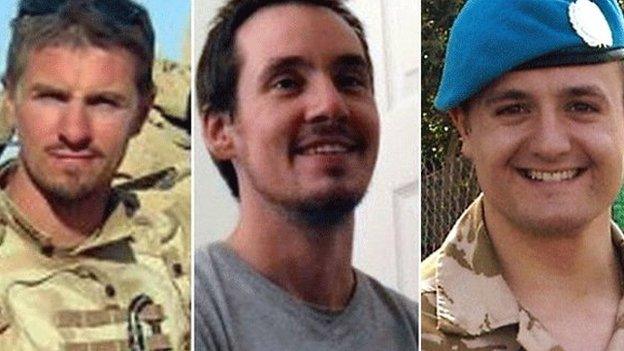Doctor's guidance 'not followed' on fatal SAS selection hike
- Published

Cpl James Dunsby, L/Cpl Edward Maher and L/Cpl Craig Roberts died in July 2013
A military doctor was "frustrated" by a lack of knowledge of heat illness policy on a fatal SAS selection march.
Captain Surgeon Graeme Nicholson told an inquest that official guidelines he authored "should have been followed".
L/Cpl Craig Roberts, 24, of Conwy county, L/Cpl Edward Maher and Cpl James Dunsby died after attempting a 16-mile march in the Brecon Beacons on one of the hottest days of 2013.
He said assessors should have been aware of environmental conditions.
Dr Nicholson wrote the Army's guidance document on climatic illness and injury., external
He told the inquest in Solihull, West Midlands, that this was "the standing guidance" and should have been followed by soldier 1A and 1B, who were in charge that day.
This document was primarily used outside the UK in hot conditions, he said.

The soldiers collapsed march in the Brecon Beacons while carrying 50lbs (22kg) of equipment
Coroner Louise Hunt asked how he felt about many witnesses not having any knowledge of the guidance.
"Frustration is the honest statement," he replied.
Keith Morton QC, representing Cpl Dunsby's father, asked: "It's completely unacceptable isn't it that those on the ground were ignorant to it?"
Dr Nicholson said: "That again I would refer back to their chain of command… I do not feel from a personal point of view that it was appropriate."
The inquest also heard it took medics an hour to reach L/Cpl Edward Maher because they had no radios and did not have a key to a locked gate.
A soldier, known as 1T to protect his identity, said he did not have any form of communication that day other than his personal mobile phone.
He said he and a colleague reached a forestry track and found the gate locked when they tried to reach L/Cpl Maher.
With no mobile phone reception, he said they identified another route through a farm, but their vehicle then became "bogged in" on the mountainside before they continued on foot with medical equipment.
The inquest continues.
- Published17 June 2015

- Published16 June 2015

- Published15 June 2015

- Published12 June 2015
